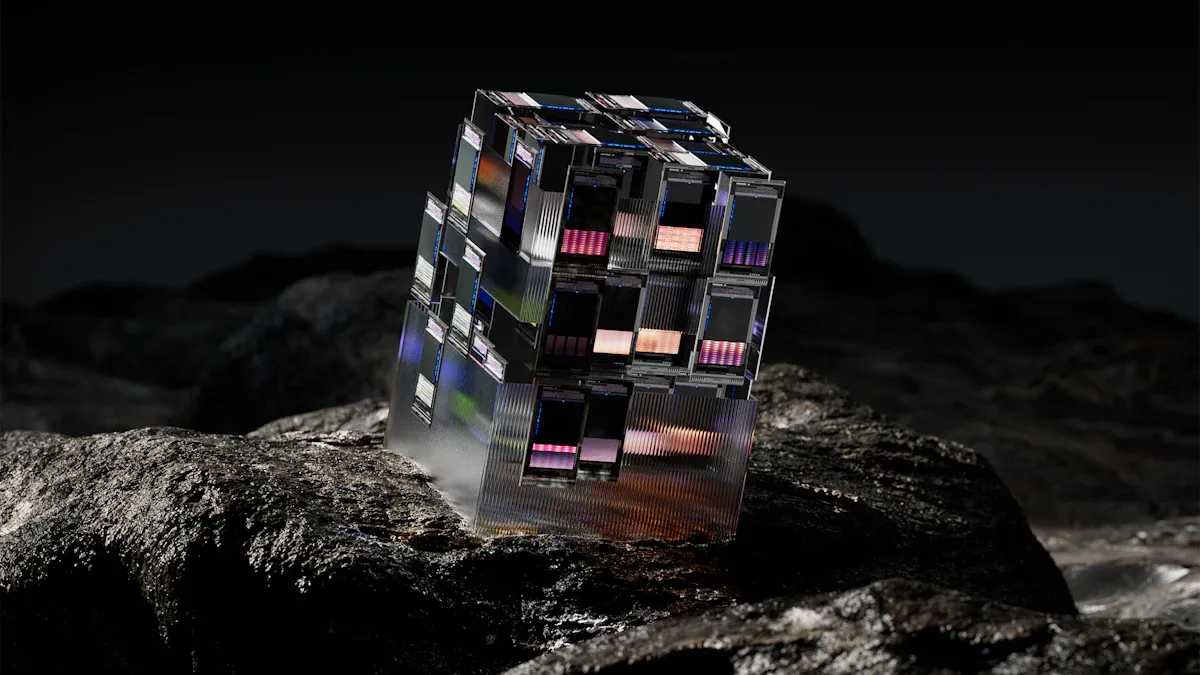
Imagine a world where your private data remains secure, thanks to quantum encryption technology. This advanced method utilizes the principles of quantum mechanics to generate codes that are virtually unbreakable. Unlike traditional techniques, it leverages the unique behaviors of quantum particles to safeguard your information. This innovative approach addresses significant cybersecurity challenges and provides robust protection that hackers cannot overcome. By harnessing the power of quantum encryption technology, it revolutionizes our understanding of online safety.
Key Takeaways
-
Quantum encryption uses quantum science to keep data safe from hackers.
-
Quantum Key Distribution (QKD) shares keys securely and spots spying fast.
-
Quantum rules stop copying of keys, making them extra secure.
-
Quantum encryption stays strong even as computers get more advanced.
-
It helps protect important data in banks, defense, and healthcare.
What Is Quantum Encryption Technology?
Definition and Key Features
Quantum encryption is a new way to secure data. It uses quantum mechanics instead of regular methods to protect information. This makes sure data stays safe, even from advanced hackers. It works by using tiny particles, like photons, to create special keys that are very hard to steal or copy.
One important part of quantum encryption is Quantum Key Distribution (QKD). This lets two people share keys safely, even on unsafe networks. If someone tries to spy, the particles change, and the spying is noticed. Another feature is superposition, where particles can be in many states at once. This helps store more data using qubits instead of regular bits. Quantum entanglement also boosts security by linking particles so that changing one affects the other instantly, no matter how far apart they are. Lastly, Heisenberg’s Uncertainty Principle adds protection because measuring a quantum state changes it, making spying harder.
Scientists have tested different ways to use quantum encryption. Lattice-based cryptography solves hard math problems for strong security. Code-based cryptography is fast and simple. Hash-based cryptography uses strong hash functions. These methods show how powerful quantum encryption is for solving today’s cybersecurity problems.
How It Differs from Traditional Encryption
Old encryption methods like RSA and AES use math to protect data. They rely on keys that are hard to crack with normal computers. But quantum computers can solve these math problems much faster, making old methods less safe.
Quantum encryption doesn’t use math to stay secure. It uses quantum mechanics to protect data. For example, QKD sends keys safely and spots spies right away. Old methods can’t always detect spying. Quantum encryption also uses qubits, which work better than regular bits for storing and securing data.
Another big difference is the no-cloning rule. In quantum mechanics, you can’t copy an unknown quantum state. This means quantum keys can’t be duplicated, making them safer. While old methods depend on hard math, quantum encryption uses physics, which is stronger against future tech.
In short, quantum encryption changes how we keep data safe. It moves past math-based methods and uses quantum mechanics for better protection against new threats.
Principles of Quantum Mechanics Behind Quantum Cryptography
Superposition and Quantum States
Superposition is a key idea in quantum mechanics. It means a particle, like a photon, can be in many states at once until observed. This helps in quantum cryptography. Using superposition, qubits are made. Qubits hold more data than regular bits. This makes quantum systems stronger and better for secure communication.
In quantum key distribution (QKD), single photons carry information. These photons are polarized in different ways, showing various quantum states. If someone tries to spy, the photon’s state changes. This makes spying attempts easy to detect. Tests show QKD can send quantum keys securely over long distances, like 100 kilometers of fiber. This ensures strong security.
Entanglement and Secure Communication
Entanglement is another amazing quantum property. When two particles are entangled, their states connect, even far apart. Changing one particle instantly changes the other. This is important for safe communication in quantum cryptography.
Entangled particles let people share data securely. If someone spies, the entanglement breaks, and the spying is noticed. Scientists in China used the Micius satellite to send entangled photons over 1,200 kilometers. This showed entanglement can create secure communication over long distances.
The No-Cloning Theorem and Its Role in Security
The no-cloning rule is a basic quantum law. It says you can’t copy an unknown quantum state exactly. This is important for quantum cryptography because it stops attackers from copying quantum keys.
This means quantum key distribution stays safe, even if cloning is tried. Tests prove that imperfect cloning causes errors, which can be spotted. This makes quantum cryptography very secure against cloning attacks. It’s a great way to protect sensitive data.
How Does Quantum Encryption Technology Work?

Quantum Key Distribution (QKD) Explained
Quantum Key Distribution (QKD) is a key part of quantum cryptography. It helps two people share encryption keys safely using quantum mechanics. Unlike older methods, QKD shows if someone tries to steal the key. This makes it a big step forward in secure communication.
QKD sends key bits using quantum states, like photon polarization. These photons move through channels, such as optical fibers, to the receiver. If someone tries to spy, measuring the photons changes their quantum state. This change warns you about the intruder and keeps the key safe.
Real-world uses of QKD prove how well it works. For example:
|
Implementation |
Description |
|---|---|
|
Tokyo QKD Network |
Links schools and labs with fiber and free-space optics. |
|
Secured votes during the 2007 election, showing government use. |
|
|
Beijing-Shanghai Quantum Backbone |
A 2,000 km fiber network in China for banks and government. |
|
Financial Services |
Used by Swiss and Austrian banks for safe transactions. |
|
Healthcare Applications |
Protects sensitive data shared between hospitals. |
These examples show how QKD is improving security in areas like finance, healthcare, and government.
Key Protocols in QKD (BB84 and E91)
Two main protocols, BB84 and E91, are the base of QKD. Each has its own way to keep key sharing secure.
-
BB84 Protocol:
BB84, created in 1984, is the first and most popular QKD protocol. It uses photon polarization to send key bits. You and the receiver measure photons to agree on a shared key. If someone spies, the no-cloning rule causes errors that you can detect. BB84 depends on trusted devices to work properly. -
E91 Protocol:
E91, made later, uses quantum entanglement for better security. Entangled particles are shared between you and the receiver. Spying breaks the entanglement, showing there’s an intruder. E91 doesn’t need trusted devices, making it a big improvement over BB84.
Both protocols have been tested a lot. BB84 and E91 can find errors caused by spying. E91’s Bell test gives stronger security, while BB84’s error checks make it easier to use in real life.
How Quantum Cryptography Detects Eavesdropping
Quantum cryptography, especially QKD, is great at spotting spies. It uses quantum mechanics to make sure any spying is noticed.
When you send a key with QKD, photons carry the information. If someone measures these photons, their quantum states change. The no-cloning rule and Heisenberg's Uncertainty Principle cause this change. Errors appear in the key, which you can find during checks.
Some important factors help measure QKD system performance:
-
Photon Detection Efficiency (PDE): Shows how well photons are detected.
-
Dark Count Rate (DCR): Counts false signals caused by noise.
-
Timing Jitter: Checks how precise photon arrival times are.
By studying these factors, you can see how secure and reliable a QKD system is. New detector technology balances these factors for better performance and strong security.
Advantages and Challenges of Quantum Encryption Technology
Advantages: Stronger Security and Ready for the Future
Quantum encryption gives unmatched security using quantum mechanics. Unlike old methods, it offers encryption that can't be cracked. This keeps your private data safe from current and future dangers, even as quantum computers grow more powerful.
A big benefit is its ability to catch spies. If someone tries to steal quantum keys, the system notices right away. This happens because quantum states change when tampered with. It ensures your messages stay private and untouched.
Another advantage is being ready for the future. Older encryption, like RSA, might fail as quantum computing improves. But quantum encryption stays strong, protecting your data against these new technologies.
Fun Fact: Secret key rates (SKR) in quantum systems can differ. Rates like 148.6 kbps and 434.8 kbps show how flexible and secure quantum cryptography is.
Challenges: Technical Issues and High Expenses
Quantum encryption has some big challenges. The technology is still new, with only a few working models. Quantum systems need special conditions, like very cold temperatures, to keep qubits stable.
Setting up Quantum Key Distribution (QKD) needs special tools. These tools are expensive and not easy to find. Small businesses may find the costs too high. Also, adding quantum cryptography to current networks often needs big changes, which adds more costs.
Building a worldwide quantum network takes huge investments. It also needs experts and advanced infrastructure. These hurdles make it hard for many industries to use quantum encryption widely.
New Research and Improvements
Scientists are working hard to improve quantum cryptography. They are using artificial intelligence (AI) to make quantum systems faster and safer. AI can help solve problems caused by quantum computers breaking old encryption methods.
Quantum Key Distribution, first made in 1984, is still a key focus. Researchers are making QKD better and easier to use. For example, new detector technology improves photon detection and reduces errors. This makes QKD systems more dependable.
These breakthroughs are helping quantum encryption grow. Soon, industries everywhere may use it for unbreakable data protection.
The Future of Quantum Encryption Technology
Real-World Applications in Banking, Defense, and Healthcare
Quantum encryption is changing banking, defense, and healthcare. In banking, it keeps transactions safe and protects customer data. For instance, Swiss and Austrian banks use Quantum Key Distribution (QKD) to secure communication. This stops unauthorized access to important financial details.
In defense, governments and groups like NATO use quantum-safe cryptography. It protects military messages from future quantum threats. The U.S. plans to switch to quantum-safe algorithms by 2035. Intelligence agencies are also studying quantum computing for better cybersecurity.
Healthcare is also using quantum cryptography. Hospitals test QKD to protect patient records and data sharing. During COVID-19, quantum tools helped improve response plans. These examples show how quantum encryption secures vital information in critical situations.
The Role of Devices Like VERTU QUANTUM in Advancing Security
Devices like the VERTU QUANTUM make communication safer. This special smartphone uses advanced quantum encryption to protect your data. It defends against even the smartest cyberattacks. With its foldable design and satellite messaging, it offers strong security and easy use.
The VERTU QUANTUM brings quantum cryptography into daily life. Its Snapdragon 8 Gen4 Supreme processor and AI tools boost productivity while keeping data safe. By making quantum tech simple, this device helps you stay secure online.
Overcoming Challenges and Scaling Quantum Cryptography
Scaling quantum cryptography means solving technical and cost problems. Researchers are improving QKD with new methods like MDI-QKD. These upgrades help systems work better over long distances.
Combining quantum and regular networks is also important. Hybrid systems let industries use quantum encryption without replacing old setups. Standard rules for QKD systems will help build secure networks.
Cost is still a big issue. But the long-term benefits make it worth the price. Tools like quantum random number generators (QRNGs) are making QKD cheaper and more reliable. As these technologies grow, quantum encryption will become easier for everyone to use.
Did you know? The quantum encryption market could grow from $634.92 million in 2024 to $11,905.98 million by 2033. This shows how much people want safer communication tools.
Quantum encryption is changing how we protect digital information. It offers strong security against new cyber threats. This technology can detect spying and block quantum computer attacks. For instance, scientists have sent secure keys over 1,200 kilometers. This shows it can work for worldwide communication.
Devices like the VERTU QUANTUM bring this tech to regular users. It uses quantum encryption to keep your messages safe. Plus, it has a modern design and useful features. As quantum technology improves, learning about it will help you stay safe online.
FAQ
What makes quantum encryption safer than older methods?
Quantum encryption uses physics, not math, to protect data. It spots spying right away by noticing changes in quantum states. Unlike older methods, it can't be broken by quantum computers. This makes it very secure and ready for the future.
Can quantum encryption work with current networks?
Yes, hybrid systems let quantum encryption work with today's networks. These systems mix old and new technologies. This helps industries use quantum security without replacing everything. It makes switching easier and less expensive.
How does the VERTU QUANTUM keep your data safe?
The VERTU QUANTUM uses advanced quantum encryption to protect your data. It blocks hackers by spotting tampering attempts. Its smart technology keeps your messages and private data safe, even from strong cyberattacks.
Is quantum encryption available for personal use?
Yes, devices like the VERTU QUANTUM bring quantum encryption to people. These gadgets make top-level security easy for personal use. They combine simple features with strong protection to keep your data private every day.
Which industries benefit most from quantum encryption?
Banks, defense, and healthcare benefit a lot from quantum encryption. It secures money transfers, protects military messages, and keeps patient data safe. These fields use quantum tech to solve modern security problems.
Tip: Learn about quantum encryption to see how it can improve your online safety.




